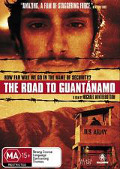
Directed by
Michael Winterbottom
95 minutes
Rated MA
Reviewed by
Bernard Hemingway

The Road To Guantanamo
Synopsis: In September 2001 four young Englishmen of Pakistani descent set off from Tipton in the Midlands to Pakistan for the wedding of one of them. One dies in Afghanistan when they are caught in crossfire between the Taliban and the Northern Alliance and the other three find themselves in Guantanamo Bay in Cuba for more than two years. This is the story of how they got there and why.With his latest film, an axe-grinding docu-drama following hard on the heels of the comedy Tristram Shandy, A Cock and Bull Story, one must acknowledge that Michael Winterbottom is not only a remarkably polymorphous director, he is also a highly prolific one. And although co-directorial credit here goes to Mat Whitecross (who as I understand it was responsible for the interview segments with the Tipton Three), most will also say that he is a very good one.
The Road to Guantánamo is a compelling account of how three likely lads from the Midlands who thought they were off for a bit of a lark in the land of their forefathers ended up on the butt-end of Uncle Sam's ill-will. Mixing news footage, interviews with the real Tipton Three and extensive dramatic re-creation filmed on location in Pakistan, Afghanistan and Iran the film is both a damning indictment of American right-wing brutality and the story of an extraordinary real-life experience. Although because Winterbottom has chosen to tell the young men's version of the story, and they are demonstrably not of unimpeachable integrity, some may argue that the film lacks objectivity, but it is precisely because of this that it gains in strength What is so remarkable about The Road to Guantánamo is that whilst the film takes us through the kind of high-powered action adventure terrain that we usually know as the domain of Hollywood's celluloid heroes, the real Ruhel, Arif and Shafiq are such ordinary young people that they could be any of us on our first trip overseas - naïve, foolhardy, looking for adventure and completely unprepared when things go wrong. So easy is it to identify with them through the various stages of their journey that we regularly find ourselves wondering what we would have done in their shoes.
The film opens with the real Tipton Three talking individually to the camera whilst the film cross-cuts to dramatic re-enactments of their words. This is initially somewhat confusing as the young actors who play them look quite different from the real-life subjects but the technique of reverting to the latter on screen helps ground the story and one eventually gets accustomed to the oscillation between the real and the fictional. In the latter respect the film is impressively made. Winterbottom and his longtime producer Andrew Eaton had worked in similar geographical regions for In This World (2002) but nevertheless the difficult logistics of filming in Pakistan and Afghanistan are evident on screen. Yet for a relatively small budget film (£1.5 million) the film always looks convincing, aided substantially by the seamless integration of the archival footage.
The performances from the young actors, all non-professional, no doubt thanks to Winterbottom's direction and editing (Mat Whitecross again getting a credit), never stray into the contrived although I could not imagine the real victims would have maintained such sang-froid. The interview segments do not probe the veracity of three young men's accounts and given their youth (Ruhel and Arif were only 19 at the time, Shafiq 21) and evident cluelessness there is no real need to do so. Winterbottom's primary concern is in showing how these would-be merry pranksters were caught in the insanity of war and the vortex of American military paranoia. Here the director is unrelenting in his depiction of the mix of ignorance, dishonesty and xenophobia that fuels the American so-called "war on terror" with its tragic consequences for so many innocent people. This we see differs little in principle from the war on Communism in Vietnam - a self-righteousness crusade against people who, as George W. puts it, "do not share our values".
The Road to Guantánamo takes us to places that none of us in our right mind would want to go but perhaps all of us should and in that respect is compulsory viewing.

Want more about this film?


Want something different?




